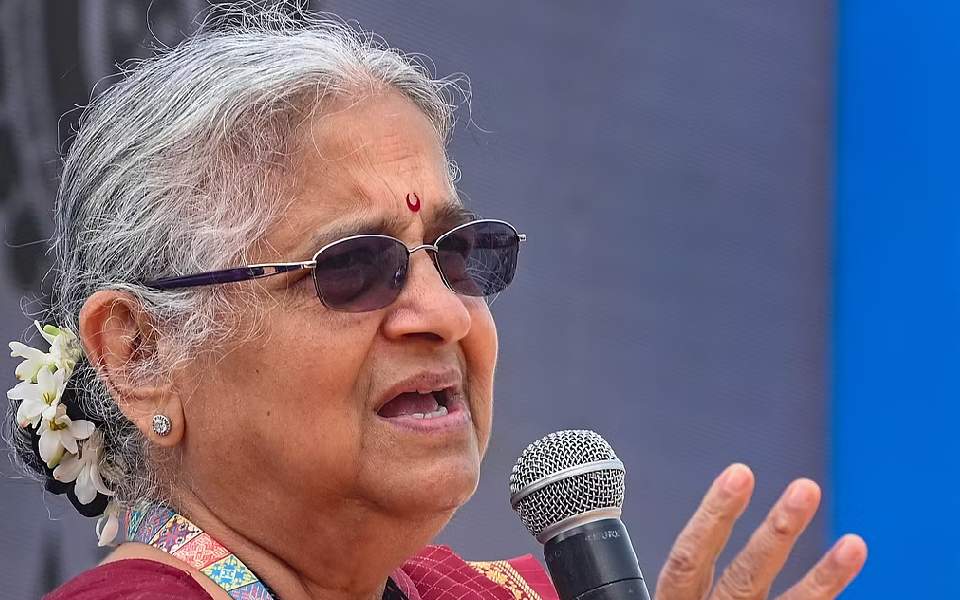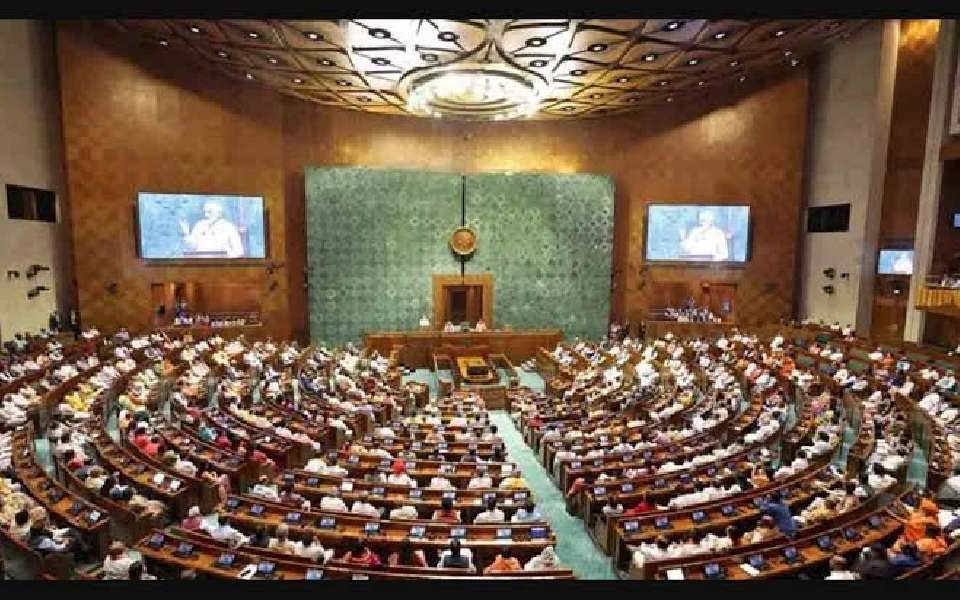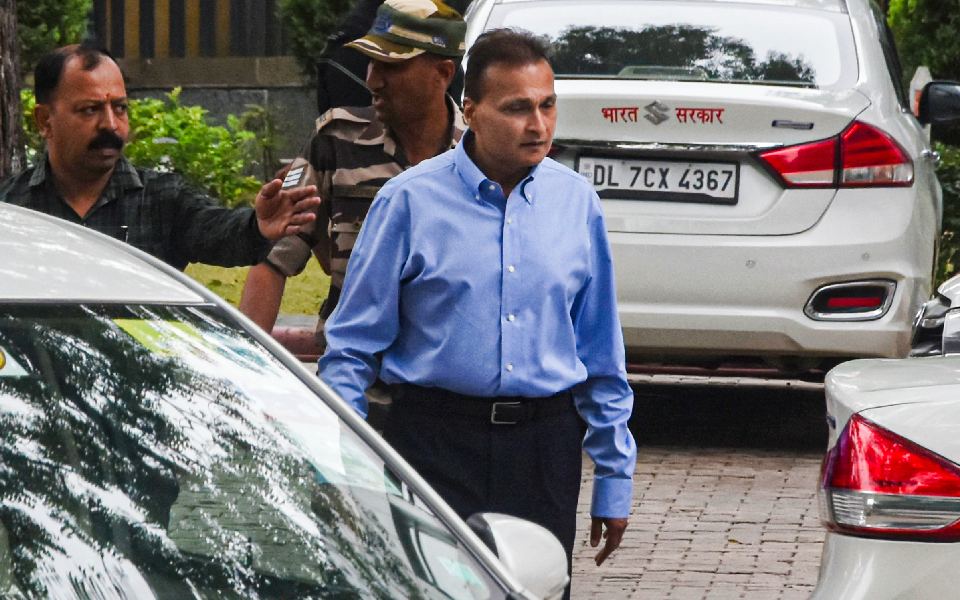Bengaluru, Sep 1: Parliamentarian and author-philanthropist Sudha Murthy on Sunday said although she has read a book set in Parliament way back in the 1980s, about Shyama Prasad Mukherjee, since so much has changed about India and the Parliament since then, that she would not mind writing about it.
"Although, I have to finish my term as a Rajya Sabha member first, before I could attempt to do that," said Murthy on Sunday.
Murthy was in conversation with fellow author and actor Twinkle Khanna, at the celebration of the launch of her 300th book title – and 46th book – 'Grandpa’s Bag of Stories' here. The event was organised by Bengaluru-based Lit Spirit Foundation.
But in her immediate list of wishes is a book on 'shlokas' that her grandfather used to recite, she said.
"Like the one my grandfather used to recite when someone went travelling or stepped out of the house," said Murthy.
Murthy also said it is not likely that she will not set her stories in the United Kingdom, even though it is the place of her grandchildren.
"There are characters in my book that are very much my grandchildren, but they are based in India…In the UK, I have been at any point of time just for 10 to 15 days. To set a story in some place, you need to know the place well, you need to interact with the people. Then only you will get a glimpse of the culture and can write comfortably about it," she said.
Khanna and Murthy also discussed their respective approaches to writing as well as what they do to stay relevant as well as the meticulous research that goes into writing a book.
Talking about her process, Murthy said, she sits down to write only after she had framed the ‘entire story’ in her mind.
"I take only 10 to 15 days to write, not more than that. But I’ll think about the story for more than a year even," said Murthy.
Khanna said she struggled a bit in the beginning to juggle being a mother and writing, but eventually found her pace and reserved her mornings for writing.
"Writing is about discipline, finding the time – whatever works for you – and being very selfish about that time," she added.
Both the authors agreed that understanding what readers want is the key to being a productive writer.
Khanna said as a writer, she had discovered along the way that it was extremely important to form a connection with the readers.
Murthy said she regularly interacted with children, as she writes a lot of children's books.
"I try to find out what problems they are facing. I may not be able to give them solutions, but I write in such a way that makes them happy," Murthy said.
Earlier in the conversation, Murthy also talked about how difficult it is to write children’s books.
"When I write for adults, I can write without any filter. But when writing for children, I want to leave a positive message. I have to be careful about what I write because I also do not want to preach to them as well. The best way to go about it is to become a child yourself. This is not easy," she said.
'Grandpa’s Bag of Stories' is published by Puffin Books and is the second in her series of grandparents’ stories. The first one was called ‘Grandma’s Bag of Stories’.
Let the Truth be known. If you read VB and like VB, please be a VB Supporter and Help us deliver the Truth to one and all.
Moscow, Aug 5 (AP): Russia has declared that it no longer considers itself bound by a self-imposed moratorium on the deployment of nuclear-capable intermediate range missiles, a warning that potentially sets the stage for a new arms race as tensions between Moscow and Washington rise again over Ukraine.
In a statement Monday, the Russian Foreign Ministry linked the decision to efforts by the US and its allies to develop intermediate range weapons and preparations for their deployment in Europe and other parts of the world. It specifically cited US plans to deploy Typhoon and Dark Eagle missiles in Germany starting next year.
The ministry noted that such actions by the US and its allies create “destabilising missile potentials" near Russia, creating a "direct threat to the security of our country” and carry “significant harmful consequences for regional and global stability, including a dangerous escalation of tensions between nuclear powers.”
It didn't say what specific moves the Kremlin might take, but President Vladimir Putin has previously announced that Moscow was planning to deploy its new Oreshnik missiles on the territory of its neighbour and ally Belarus later this year.
“Decisions on specific parameters of response measures will be made by the leadership of the Russian Federation based on an interdepartmental analysis of the scale of deployment of American and other Western land-based intermediate-range missiles, as well as the development of the overall situation in the area of international security and strategic stability,” the Foreign Ministry said.
The Russian statement follows President Donald Trump's announcement Friday that he's ordering the repositioning of two US nuclear submarines “based on the highly provocative statements” of Dmitry Medvedev, who was president in 2008-12 to allow Putin, bound by term limits, to later return to the office. Trump's statement came as his deadline for the Kremlin to reach a peace deal in Ukraine approaches later this week.
Trump said he was alarmed by Medvedev's attitude. Medvedev, who serves as deputy chairman of Russia's Security Council chaired by Putin, has apparently sought to curry favor with his mentor by making provocative statements and frequently lobbing nuclear threats. Last week. he responded to Trump's deadline for Russia to accept a peace deal in Ukraine or face sanctions by warning him against “playing the ultimatum game with Russia” and declaring that “each new ultimatum is a threat and a step toward war.”
Medvedev also commented on the Foreign Ministry's statement, describing Moscow's withdrawal from the moratorium as “the result of NATO countries' anti-Russian policy.”
“This is a new reality all our opponents will have to reckon with,” he wrote on X. “Expect further steps.”
Intermediate-range missiles can fly between 500 to 5,500 kilometers (310 to 3,400 miles). Such land-based weapons were banned under the 1987 Intermediate-range Nuclear Forces (INF) Treaty. Washington and Moscow abandoned the pact in 2019, accusing each other of violations, but Moscow declared its self-imposed moratorium on their deployment until the US makes such a move.
The collapse of the INF Treaty has stoked fears of a replay of a Cold War-era European missile crisis, when the US and the Soviet Union both deployed intermediate-range missiles on the continent in the 1980s. Such weapons are seen as particularly destabilising because they take less time to reach targets, compared with intercontinental ballistic missiles, leaving no time for decision-makers and raising the likelihood of a global nuclear conflict over a false launch warning.
Russia's missile forces chief has declared that the new Oreshnik intermediate range missile, which Russia first used against Ukraine in November, has a range to reach all of Europe. Oreshnik can carry conventional or nuclear warheads.
Putin has praised the Oreshnik's capabilities, saying its multiple warheads that plunge to a target at speeds up to Mach 10 are immune to being intercepted and are so powerful that the use of several of them in one conventional strike could be as devastating as a nuclear attack.
Putin has warned the West that Moscow could use it against Ukraine's NATO allies who allowed Kyiv to use their longer-range missiles to strike inside Russia.





